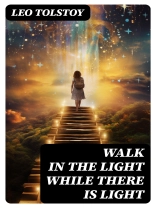In ‘Walk in the Light While There is Light, ‘ Leo Tolstoy presents a thought-provoking exploration of morality, faith, and the nature of goodness. Written in a reflective and philosophical style, the book consists of a series of essays and meditations that revolve around the ethical dilemmas faced by individuals in their personal and collective lives. Tolstoy’s prose is both lyrical and incisive, engaging readers to confront challenging moral questions within the context of their spiritual and social environments, echoing the literary tradition of Russian realism while simultaneously projecting his own spiritual crisis onto the broader canvas of human experience. Leo Tolstoy, one of the giants of Russian literature, is known for his monumental works such as ‘War and Peace’ and ‘Anna Karenina.’ A deeply spiritual man grappling with existential questions, Tolstoy’s later life saw him embark on a quest for a simpler, more meaningful existence. His quest for authenticity and understanding of God’s will is vividly portrayed in this collection, making it a reflection of his evolving philosophical and theological beliefs, especially his emphasis on love, moral integrity, and social responsibility. ‘Walk in the Light While There is Light’ is highly recommended for readers interested in philosophical literature that transcends time and cultural boundaries. Tolstoy’s insights not only resonate with those grappling with ethical challenges today but also illuminate the profound spiritual undercurrents intrinsic to human existence, making this work an essential read for anyone seeking to explore the depths of human morality and purpose.
Про автора
Count Lev Nikolayevich Tolstoy, commonly known as Leo Tolstoy, was a towering figure in the realm of literature, renowned for his intricate narratives and profound psychological analysis. Born into Russian nobility in 1828 and passing in 1910, Tolstoy’s contributions to literature cannot be overstated. His opuses, ‘War and Peace’ and ‘Anna Karenina, ‘ are heralded as pinnacles of realist fiction, often cited for their intricate character development and sweeping narratives that broadly illustrate Russian society. Tolstoy’s literary style is marked by his use of detailed realism and moral pondering, which permeates even his lesser-known works like ‘Walk in the Light While There is Light.’ This lesser-discussed piece continues Tolstoy’s exploration of Christian themes, particularly the moral imperatives of faith and the virtues of simplicity, themes that became more pronounced as Tolstoy underwent a profound spiritual awakening in his later years. Not merely a novelist, Tolstoy also engaged with philosophical and social activism inquiries, especially in his post-conversion philosophical treatises, such as ‘The Kingdom of God Is Within You, ‘ where he expounded on nonviolent resistance. His influence extended beyond literature into religious and philosophical realms, impacting figures like Gandhi. Tolstoy’s rich legacy is encapsulated in his mastery of the craft of storytelling, coupled with an undying devotion to exploring the loftiest ethical and existential quandaries of human existence.












